
 |
|
|
|
|
Height: 5' 11" (1,8 m) Weight: 170 lbs. Eyes: blue Hair: black Marriages: (1) Frances Beranger, actress (Sep 20. 1930, ca feb 1931, divorce) (2) Maxine Dailey Lewis**, radio singer/dancer (Jan 16. 1934 - Jul 1934, divorce) Daughter: Donna Dailey Cook (May 22. 1934 - ) (3) Princess Gioia Tasca di Cuto (1937 - until Oct 1961, his death) (4) Partner, Joan Bennett (1956 - his death) Siblings: Mortimer Parker (Jul 30. 1892 - Dec 18. 1976), Ransom McCurdy (Dec 23. 1899 - Feb 14. 1986) Marjorie (1892 - bfr. 1961) |
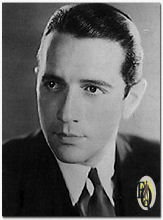 |
| Above right: Publicity photo of a young Donald Cook | |
|
Donald Fenton Cook
was born on September 26. 1901, in Portland, Oregon, to Frank Ransom Cook
(1867 - 1951) and
Edith Lara Parker (1863 - 1940). His father was originally
from Sandusky, Ohio, and later relocated to Hilo, Hawaii. He worked
briefly as a bank clerk but gave up the job to try his hand at vaudeville during
the early 1920s. At one point, he toured the West in a song-and-patter act. "Strictly
small time," he explained. One night, when he teamed up with a partner for an
amateur song-and-patter act at The Wigwam in San Francisco, the duo—Cook and Wadhams—secured a four-month booking in vaudeville, touring small Western towns
and traveling as far as Amarillo, Texas. However, the booking agent who was
supposed to meet them there and send them to Chicago failed to appear. He thought he was down on his luck—but he was wrong. In truth, his theatrical pursuits were more of a passion than a necessity, as his family was in the banking business. Although they disapproved of his career choice, they never suffered financially. His love for the stage led him to perform in the Kansas City community theater, where he caught the attention of actress Margaret Anglin. Impressed by his work, she invited him to visit her at her hotel and encouraged him. "It seemed too good to be true," Cook later recalled. His two years with the Kansas City Community Players were not in vain. In the summer of 1925, armed with letters of introduction from Miss Anglin to three producers, Cook arrived in New York. Two of the producers rejected him, and the third, George C. Tyler, was in Europe. While waiting, Cook studied voice and dance. When Tyler returned, he interviewed Cook and sent him to Minneapolis to join a star-studded company performing The Rivals on tour. The cast included Chauncey Olcott, James T. Powers, and Mrs. Minnie Maddern Fiske. Cook absorbed advice from these seasoned actors but was particularly grateful to Mrs. Fiske, who coached him in his role as Captain Absolute. He credited her with his "fundamental knowledge of comedy technique," noting that she had taught him everything he knew about the theater. |
|
|
Cook joined the Hartman Stock Company, which performed at the Hartman Theater in Columbus. Between October 14. 1925, and May 11. 1926, he appeared in several plays. The company, organized by John Hayden in New York, included actors such as William Ingersoll, Gilberta Faust, Donn Cook, Jean Ford, and John Lott. Kansas City's Little Theater had produced several notable performers, including Donn Cook, who went on to appear in Mrs. Fiske's all-star revival of The Rivals (Jul 1926) Later, Cook would say it took him three years to reach New York. One year after leaving Kansas City, he was on Broadway, and from then on, he was rarely "at liberty." Before making his Broadway debut, he appeared in 48 Hours Leave in San Francisco. He then performed under the name Donn Cook as John Roberts in Seed of the Brute (Little Theatre, Nov 1. 1926 - Jan 1. 1927). He also performed in New York Exchange, a play by Peter Glenney, which was staged at the Klaw Theatre (Dec 25. 1926 - Jan 8. 1927) and the 49th Street Theatre (Jan 10. 1927 - Mar 12. 1927). The cast, led by Alison Skipworth and Sydney Shields, included Doris Underwood, Mabel Montgomery, Brandon Evans, and Donn Cook. "Donn Cook, as the spineless hero, is not one to enlist the sympathy of the audience. His interpretation is hardly consistent and in one dramatic climax he drew not a faint titter." (Billboard, Dec 30. 1926) In Spellbound, a three-act play by Frank Vosper, Cook played Rowlie Bateson, a young boarder manipulated by Ethel Underwood into murdering her husband, Harold Carter. The play ran for 24 performances at the Earl Carroll Theatre (Nov 14. – Dec 1. 1927), with Elisabeth Patterson, Campbell Gullen, and O.P. Heggie in the leading roles. Shortly afterward, he found success starring alongside Madge Kennedy in Paris Bound (aka The Wedding), a three-act comedy performed at the Music Box Theatre in New York (Dec 27. 1927 - Jul 1. 1928). In this play, which also went on tour after New York, he portrayed a different kind of husband—the type who travels to Europe in search of romance. |
|
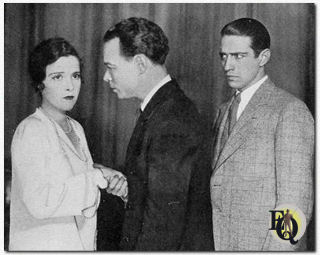 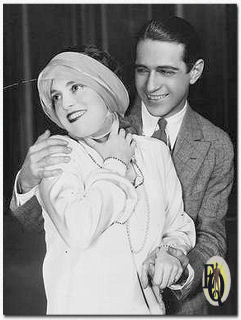 Above left: Madge Kennedy, Donald MacDonald and Donn Cook. in Paris Bound, a Comedy in 3 acts at the Music Box Theatre New York (starting Dec 27. 1927). Above right: Madge Kennedy as Mary Hutton and Donn Cook as Jim Hutton in Paris Bound (Music Box Theatre, Dec 27. 1927 - Jul 1. 1928). |
|
|
On Broadway, Donn Cook played in support of Miss Claiborne Foster in Gypsy (Klaw Theatre, Jan 14. 1929 - Mar 9. 1929). Donn then joined the Murphy-Brown Players at The Wieting in Syracuse, where he performed with great success in several plays—at an intense schedule of nine shows a week. In five consecutive productions by the Murphy-Brown Players, some unfortunate husband always took a hit—literally. Donn Cook had the worst of it. In This Thing Called Love (Apr 1.) and Excess Baggage (Apr 15.), he discovered his wife in another man's arms. Even in Seventh Heaven (Apr 22.), only Chico’s blindness prevented him from witnessing the same betrayal upon his return from war—though Donn still managed to injure himself, slashing his finger while grabbing a knife away from Helen Baxter. In The Royal Family (Apr 8.), Albert Hayes had to stand by as his young wife practically deserted him and their baby to return to the stage. Seventh Heaven (Apr 22.) starring Helen Baxter and Donn Cook as lovers. The trend continued in Camera (Apr 29.), when Bill Jeffrey’s character stood on a club veranda, helplessly watching his wife in yet another familiar embrace. Major honors in these productions went to Frank Wilcox and Ralph Murphy’s co-stars, Helen Baxter and Donn Cook. In Camera, Donn played Jerry Donovan, an expert cameraman who himself was screened as the ideal Romeo. In The Skull (May 6.), a blood-curdling thriller, Donn played a lawyer, while Helen Baxter portrayed the woman he loved and rescued from a dangerous criminal. Frank Wilcox had a pivotal role as Captain Allenby. The following week’s production, An American Tragedy (May 13.), delivered stark realism, with Donn Cook and Lucia Laska carrying the emotional weight of the play beautifully. In The Command to Love (May 21.), Donn, dressed in a resplendent costume, portrayed Gaston, Marquis Du Saint-Lac, a French military attaché ensnared by the statuesque and jealous Marie-Anne (Ethel Wilson), wife of the unsuspecting French ambassador (William Jeffrey). But, as diplomacy would have it, the honor of his republic required that Donn’s character win the favor of Manuela (Helen Baxter), the coquettish wife of the Spanish war minister. The Brown Players of 1929 close their season with Whispering Friends (Nov 16. 1929). They had an unusually long and successful run having opened in February and continued without a break. Thirty-six plays have been presented in the 35 weeks, three of them musical comedies with guest starts. He also starred as Donn Cook in Half Gods (Plymouth Theatre, Dec 21. 1929 – Jan 4. 1930) and Rebound (Plymouth Theatre, Feb 3. – May 1. 1930), continuing to use that stage name until 1930—even in his first film assignments. Despite his eventual transition to film, Donald never betrayed his love for the theater. |
|
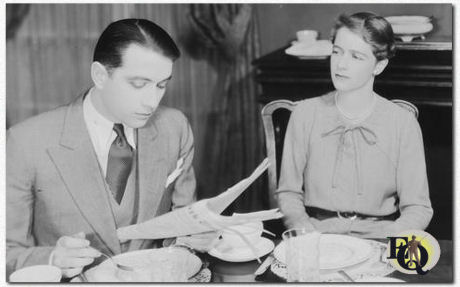 Above: Donn Cook as Bill Truesdale and Hope Williams as Sara Jaffrey in Rebound (Plymouth Theatre, Feb 3. – May 1. 1930). |
|
|
At Elitch Gardens in Denver, Selena Royle and Donn Cook were signed as leading members of the summer stock company. Others engaged included Nedda Harrigan, Raymond Bramley, Duncan Penwarden, J. Arthur Young, and Frances Beranger. The season opened on June 14. 1930 with Holiday, Melville Burke directing the company. Donn was cast in a dual role and scored individually in the serious drama Brothers (Elitch Gardens, Jul 12. 1930). During this time, Cook fell in love with Frances Beranger. On September 16. 1930, newspapers announced the engagement of Frances Beranger (sometimes spelled Berwanger), an actress and the daughter of Mrs. William DeMille*, to Donn Cook, a leading man in New York. The announcement was made by Frances's mother. While no definite wedding date was set, Mrs. Clara DeMille stated in the article that the wedding would likely take place within the next month. “We were in love, and she urged me to go to Hollywood,” Cook later recalled. “I did, and we were married when she returned to the coast from Denver.” The couple wed in Los Angeles on September 20. 1930, and moved to Whitley Heights, Hollywood. The marriage, however, lasted only six months. “We didn't hit it off,” was Donald's only comment. Despite the short-lived marriage, Cook credited his engagement at Elitch Gardens with helping him secure his first Hollywood contract—with Warner Brothers. |
|
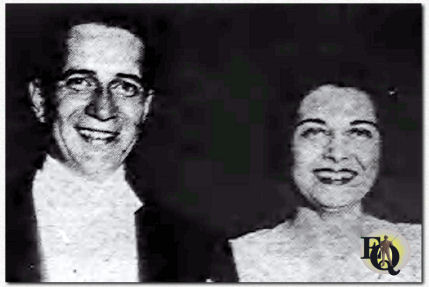 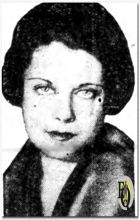 Above left: Miss Frances Beranger, daughter of Mrs. William DeMille, was married to Don Cook, New York actor, in Chicago. They met while appearing on the stage together in Denver. Above right: An engagement of interest to many Syracuse theatergoers is that of Miss Frances Beranger, daughter of Mrs. William C. DeMille, and Donn Cook, former member of the Wieting Stock Company. |
|
|
He began his screen career with the musical short Roseland (Warner Bros., Sep 7. 1930) before moving on to feature films. It's fair to say that Donald Cook initially entered films as a leading man during the early sound era. His first feature film was Unfaithful (Paramount, Mar 14 .1931), starring Ruth Chatterton and Paul Lukas. Billed as Donald Cook, he was loaned to Paramount from First National for the role. A newspaper reported Cook on his way from Los Angeles to Honolulu to visit his parents and since Donn Cook's name was always misspelled he decided to make the best of things and call himself Donald Cook. (New York Sun, Jul 28. 1931) Although he was certainly a skilled and handsome actor, his features were not as strikingly defined as those of Hollywood’s top stars. As a result, he was eventually relegated to supporting roles. Cook spent seven years in Hollywood, appearing in 30 films. He often projected a somewhat dour personality, which proved especially effective in his role as Mike Powers, the shell-shocked war veteran and brother of James Cagney’s character in The Public Enemy (Warner Bros., Apr 23. 1931). He also played the protégé of a crippled ballet impresario, portrayed by John Barrymore, in The Mad Genius (Warner Bros., Oct 23. 1931), and Bette Davis' love interest in The Man Who Played God (Warner Bros., Feb 9. 1932). |
|
|
Above right: Donald with Sylvia Sydney in Jennie Gerhardt (Paramount, Jun 9. 1933). |
|
|
In 1932, Donald Cook and actress Evalyn Knapp (a 1932 WAMPAS Baby Star, along with Marion Shockley) announced their engagement. However, for reasons unknown, the marriage never took place. (Above middle). Reportedly, Cook had a unique hobby—collecting stray dogs and giving them a home until friends adopted them, ensuring he always had room for another. After moving into a new home in Beverly Hills, he prioritized his canine companions, building a wire enclosure for his five dogs and housing them safely before even moving in his own belongings. One of his dogs, a white one, was named Jean—after Jean Harlow (1932). In May–June of 1932, Cook suffered a concussion after being hit by an automobile. |
|
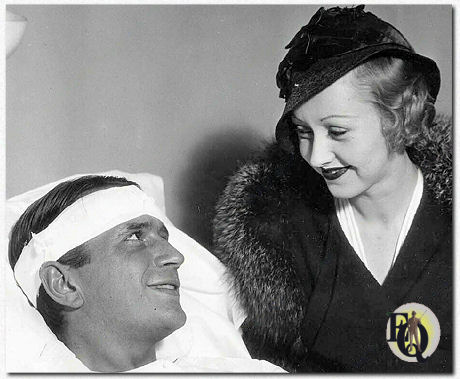 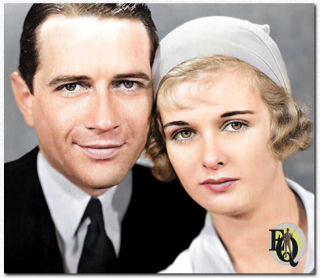
Top left: Evalyn Knapp visits Donald Cook in the hospital after an auto accident. Above right: Donald Cook as Lt. John Gregg in Private Jones (Universal, Mar 25. 1933). |
|
|
In 1933, after meeting radio singer Maxine Lewis, Donald Cook proposed to her on August 11, and she accepted. However, on November 16., Cook was named in a $100,000 breach of promise lawsuit filed by Lewis, who alleged, among other things, that she was soon to become a mother. By January 13. 1934, it appeared that the couple had reached an agreement, as it was revealed that they would be married privately on Tuesday, January 16. "I'm terribly happy," Miss Lewis told newspapers. On May 22. 1934, in Los Angeles, Maxine gave birth to a daughter, Donna Dailey Cook. However, the marriage quickly fell apart. According to a divorce suit filed on June 29. 1934, Cook insisted on returning to Hollywood just two days into their honeymoon. Mrs. Cook accused him of being sullen and morose***, claiming that he preferred to sleep all day and stay out all night. |
|
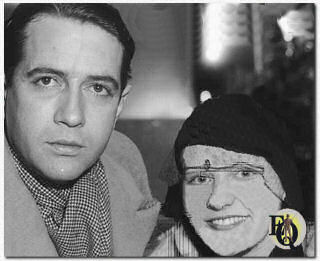 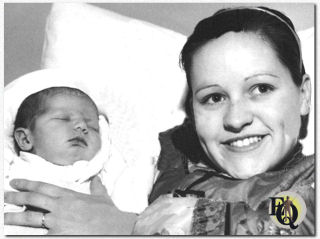 Above left: Donald Cook and Maxine Lewis obtaining their marriage license (1934) Above right: Donna Daily Cook, 4 days old, daughter of Donald Cook, film actor, and his wife, the former Maxine Dailey Lewis, singer, was more interested in getting her full quota of sleep than in such things as picture taking when she was photographed with her mother in a Hollywood Hospital (May 26. 1934). |
|

| He was one of the first film actors to portray Ellery Queen. In The Spanish Cape Mystery, (Republic, Oct 9. 1935) a low-budget mystery Cook plays Ellery Queen in a low-key, poker-faced fashion, which may not be terribly exciting but is actually closer to the original concept than most of the movie Queens. However Cook's flirtatious Ellery is unrelated to any Ellery Queen novel. (Pictures below left and right) |
.jpg) .jpg) |
|
He was one of the suspects in the Philo Vance mystery The Casino Murder Case (MGM, Mar 15. 1935), played the role of Steve opposite Helen Morgan's Julie in the film adaptation of Show Boat (Universal, May 14. 1936), and starred as a heroic U.S. Immigrant Inspector in the Deporting Squad in the film Ellis Island (Chesterfield, Nov 5. 1936). In 1937, Cook married former Princess Giovanna Mastro-Giovanni Tasca di Cuto (also known as Gioia Tasca di Cuto), and the couple resided on Long Island, NY, where he was hired by the Theatre Guild. They also had a home in Connecticut. Due to his unremarkable and increasingly minor Hollywood roles, Cook returned to the stage. On Broadway, he appeared in Wine of Choice (Guild Theatre, Feb 21. – Mar 30. 1938), American Landscape (Cort Theatre, Dec 3. 1938 – Jan 7. 1939), and Skylark (Morosco Theatre, Oct 11. 1939 – May 25. 1940), in which he starred as the leading man alongside Gertrude Lawrence and Glenn Anders. He also performed off-Broadway in the tryouts for We, the Willoughbys (Berkshire Playhouse, Jun 27. 1938 - ) in Stockbridge, Massachusetts. Since good film roles were rarely offered to him, Cook increasingly turned to radio. Though much of his radio work remains undocumented, he was heard on The Rudy Vallee Hour (NBC, Sep 14. 1939), where Rudy Vallee sang with Carmen Miranda, and in Life Begins (CBS, Jan 22. 1940 – Jul 18. 1941), in which Cook played Dick Young and later Lloyd Crawford, the love interest of Virginia Craig (played by Toni Gilman). The show's title was later changed to Martha Webster. Additionally, he performed alongside Agnes Young in Mother of Mine (aka Mother O'Mine, NBC- Sep 30. 1940 - Jul 4. 1941); in The Wrong Way to Write (CBS, Jun 7. 1940), an episode of Campbell's Short Short Story about an April Fool’s prank gone wrong; in Campbell’s Playhouse with Walter Huston (ABC, "Little is So Little", Nov 17. 1940); in Charlie and Jessie (CBS, Dec 13. 1940 - Jan 17. 1941) with Nelson Case and Florence Lake; and in Wings of an Eagle (CBS, Feb 23. 1941), an episode of The Columbia Workshop, described as a poignant and beautifully told crime story. In 1941, Cook performed an average of 10 radio broadcasts per week, though in the past he had completed as many as 35 in a single week. He lived on East 48th Street in the Turtle Bay district of New York and also owned a farm in Cobalt, Connecticut. He rarely spoke about his craft, referring to acting as "play-pretending" and doubting that he would remain an actor forever. "An actor," he once said, "has too many crutches... first, the author writes his lines, and then a director tells him how to deliver them. I'll get into something else eventually—maybe directing or writing." |
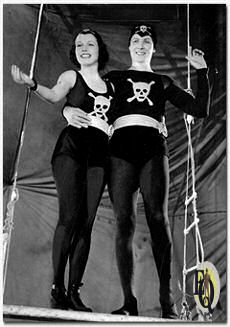 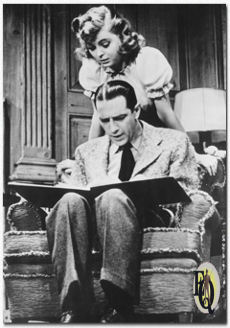 Above left: In Circus Girl (Republic, Mar. 1. 1937) trapeze artist Kay Rogers (June Travis) marries aerial-act member Charles Jerome (Donald Cook), who immediately become jealous of fellow-trapeze artist Bob McAvoy, and sets out to kill him. Above right: A scene from the 1942 stage play Claudia (Booth Theatre, Feb 12. 1941 - Jan 9. 1943) included Donald Cook and Dorothy McGuire. |
|
It was the Broadway stage, however, that gave him the widest range to display his talents—particularly his flair for comic lechery. He starred in Claudia (Booth Theatre, Feb 12. 1941 - Jan 9. 1943), Made in Heaven (Henry Miller's Theatre, Oct 24. 1946 - Jan 11. 1947), and Portrait in Black (Booth Theatre, May 14. 1947 - Jul 5. 1947). In 1941, he received a gold medal from the New York Academy at The Lambs Club for giving "the best light comedy performance of the year" in Claudia. He also enjoyed a comedic partnership with Tallulah Bankhead, appearing alongside her in Foolish Notion (Martin Beck Theatre, Mar 13. 1945 – Jun 9. 1945) and a 1948 revival of Private Lives (Plymouth Theatre, Oct 4. 1948 – May 7. 1949). He actually spent three years performing Private Lives with the tempestuous Tallulah—on Broadway, on tour, and in summer stock (starting with tryouts in Boston in July 1946). Television provided a welcome change of pace, with appearances in The Philco Television Playhouse (in "A Murder Has Been Arranged", NBC - Aug 14. 1949), The Billy Rose Show (in "Pick Up", ABC - Jan 2. 1951), and The Prudential Family Playhouse (in "Skylark", CBS, Jan 16. 1951). By 1950, he had forsaken films entirely in favor of stage work. In the original 1951 Broadway run of The Moon Is Blue (Henry Miller's Theatre, Mar 8. 1951 - May 30. 1953), he delighted Manhattan theatergoers as Barbara Bel Geddes' would-be seducer. This was his longest-running play, and the 1953 film adaptation caused a scandal at the time for using the word "virgin" while depicting a woman's bedroom. In the film, Cook's role was played by David Niven. In 1952, Cook served as chairman of the personnel committee of the Actors' Equity Association. |
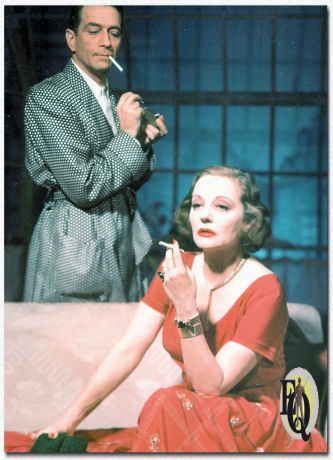 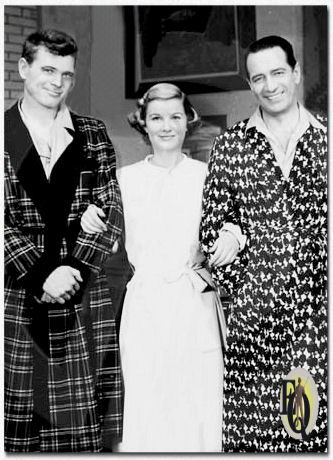 Above left: Tallulah Bankhead with Donald Cook in Private Lives (Plymouth Theater, 1948). Above right: In the original 1951 Broadway run of The Moon Is Blue Cook (R) delighted Manhattan theatergoers as Barbara Bel Geddes' would-be-seducer. |
|
The following year, Cook was also heard on radio in My Son Jeep (NBC, Jan 25. - Jun 7. 1953) and subsequent CBS TV dramatizations in 1954. Donald Cook played Dr. Robert Allison, a widower in Grove Falls, USA, who is left to raise his sweet thirteen-year-old daughter, Peggy (played by Joan Lazer), and his mischievous ten-year-old son, Jeffery "Jeep" Allison, a boy reminiscent of Dennis the Menace. In 1954, it was reported that Cook owned a farm in New Jersey and planned to build a house on Fire Island. "I took a course in weaving," he said, "I found it fascinating. I have two looms now... During the run of 'The Moon is Blue', I took a course in real estate." Among his other hobbies were photography and raising Hungarian sheepdogs. He appeared in the following Broadway plays: King of Hearts (Lyceum Theatre, Apr 1. 1954 - Nov 27. 1954), Champagne Complex (Cort Theatre, Apr 12. 1955 - Apr 30. 1955) and Goodbye Again (Helen Hayes Theatre, Apr 24. 1956 - Apr 28. 1956). It was during this time, in the mid-1950s, that he became re-associated with Joan Bennett, when he replaced Claude Dauphin in the comedy Janus, lasting through the eleven-month tour with Joan. From 1956, Joan Bennett was seriously involved with Donald Cook, whom she referred to as the love of her life. (He had legally separated from Gioia a few years before his death.) |
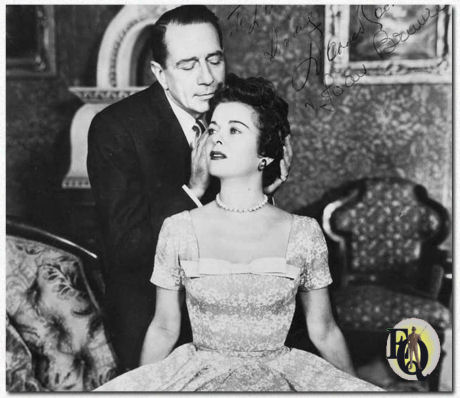 Above: Donald Cook he became re-associated with Joan Bennett, when he replaced Claude Dauphin in the comedy Janus (1956). |
|
In her excellent book The Bennett Playbill (1970) Joan describes their “’first’’ meeting. "Producer Alfred de Liagre was looking for a leading man, and since was given cast approval, I suggested the distinguished actor Donald Cook. I’d seen him in his greatest successes, 'Skylark', 'Claudia' and 'The Moon Is Blue' and thought him a superb actor. We met during the preparation of Janus, and because I felt I knew him, I said ‘Hello Donald’ to which he replied, formally, ‘How do you do, Miss Bennett.’ It was the beginning of one of the most important relationships of my life." Neither Cook nor Joan could remember appearing together in 1932's The Trial of Vivienne Ware. Over the years, Donald believed his leading lady had been Fay Wray, and Miss Bennett felt certain that John Boles had been her co-star in the Fox film. Commenting on their mutual lapse of memory, Miss Bennett said, "No such memory lapse about Donald Cook would ever occur again, and I consider the four years we worked together among the most charmed of my life. It was a four-year acting lesson. An actor who was the very opposite of the introspective performer, his off-hand charm and ease with a laugh line were incomparable. Endowed with impeccable timing, he knew exactly when to drop the bomb, and his technique was accurately described as 'playing with a steady glib absurdity.' " He also made television appearances in Goodyear Television Playhouse (in "The Treasure Hunters", NBC - May 26. 1957), and Wanted: Dead Or Alive (in "Angels of Vengeance", CBS - Apr 18. 1959). But perhaps he is best known for his role as "Tom Blake" next to Joan Bennett in the television series, Too Young To Go Steady (NBC, 7 episodes between May 14. and Jun 25. 1959). Donald made a will in March 1958, naming Joan Bennett the sole beneficiary. Although he still performed in plays on Broadway it seemed his greatest successes there were in the past: Love Me Little (Helen Hayes Theatre, Apr 15. 1958 - Apr 19. 1958) and Masquerade (John Golden Theatre, Mar 16. 1959 - Mar 16. 1959). |
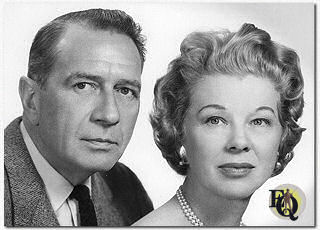 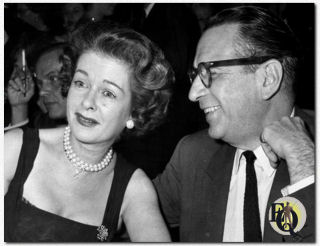 Above left: Donald Cook and Glenda Farrell in Masquerade (aka Lovely Star, Good Night) a play in 3 acts performed at the John Golden Theatre on Mar 16. 1959. Above right: Candid picture of Joan Bennett and Donald Cook both guests at a recent Palace Theater party following the premiere of Pillow Talk (Oct 19. 1959). |
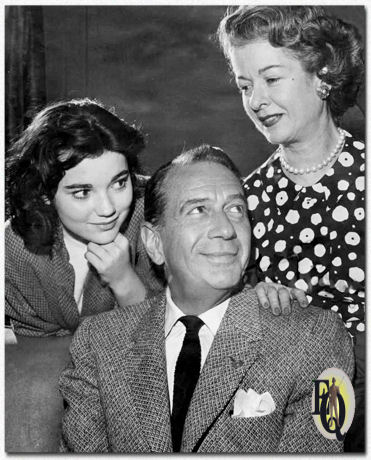 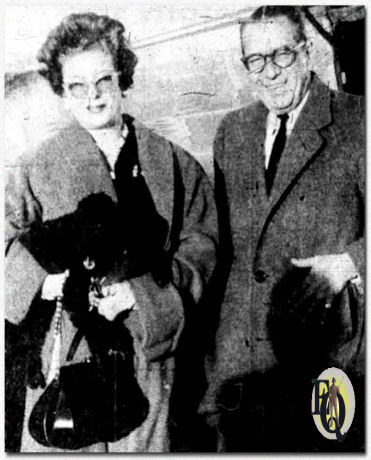 Above left: Publicity shot for the TV-show Too Young To Go Steady (NBC, May 14. - Jun 25. 1959, min. 7 episodes), Cook is seen here with Brigid Bazlen (L) and Joan Bennett (R). Above right: Joan Bennett, Tinker Bell, and Donald Cook arrive in Odessa, Texas, for the night's performance of The Pleasure of His Company (Dec 1. 1960). |
|
His death on October 1. 1961, came a day after he suffered a heart attack*** while in New Haven, CT, for the tryout of a new Broadway play. After he failed to appear for a matinee performance of the French comedy A Shot in the Dark, an adaptation of the play L'Idiote, starring Julie Harris and William Shatner, the manager of the play had a bellhop check Cook's room. The bellhop found Cook semi-conscious on the floor of his hotel room. He was taken to Grace New Haven Hospital, where he died, aged 60. Joel Thomas, the understudy, stepped in, but it was Walter Matthau who took over Cook's leading role in the play following his death. To Joan Bennett, it was a horrifying blow, and she wrote, "I was heartbroken and at a loss myself, not only personally but professionally. Working with Donald, I understood what 'ensemble' playing meant for the first time and felt I never wanted to set foot on a stage again without him." Of course, she did return to the stage. Cook left his widow Joya (sic), from whom he had been legally separated several years earlier, and two brothers in San Francisco. He was buried at River View Cemetery in Portland, Oregon. For his contributions to the motion picture industry, Cook was honored with a Hollywood Walk of Fame star located at 1718 Vine Street. |
|
Notes: * Screenwriter Clara Strouse married Albert Berwanger in 1907, with whom she had a daughter Frances. When Clara began to write she would change her name to Beranger. She married screenwriter, film director William C. DeMille (elder brother of Cecil B. DeMille). ** Maxine D. Lewis became a booking agent with the entertainment industry for more than 50 years. Her daughter Donna D. Burke lived in Lucasville, Ohio. *** Although unconfirmed, rumors circulate that Donald was an alcohol and drug (cocaine) addict at the time of his marriage to Maxine and that this was the immediate cause of the divorce. The same source also states that Cook had lung cancer at the time of his death. All dates for movies are for the first US release. All dates for TV programs are original first airdates. All dates for (radio) plays are for the time span the actor was involved. Facts in red still need confirmation. |
|
Click on Uncle Sam if you think you can help out...!
|
|
Other references (1) Wikipedia (2) IMDb (3) IBDB (4) Radiogoldindex (5) OTRRpedia (6) Rotten Tomatoes (7) Playbill (8) Spectra - IOBDB Additional video & audio sources (1) The Public Enemy (1931) James Cagney takes a punch from Donald Cook (2) Old Time Radio Downloads (3) Too Young To Go Steady Clip 1959 TV program (YouTube-Gilmore Box) |
|
This actor profile is a part of
Ellery Queen a website on deduction.
The actor above played Ellery Queen in
an Ellery Queen movie.
Click Uncle Sam if you think you can help
out...! Many of the profiles on this site have been compiled after very careful research of various sources. Please quote and cite ethically! |
|
Page first published on April 23. 2017 Version x2.4 - Last updated April 23. 2025 |
 b a c k
t o L i s t o f S u s p
e c t s
b a c k
t o L i s t o f S u s p
e c t s
|
|
| Introduction | Floor Plan | Q.B.I. |
List of Suspects | Whodunit? | Q.E.D. | Kill as directed | New | Copyright Copyright © MCMXCIX-MMXXV Ellery Queen, a website on deduction. All rights reserved. |